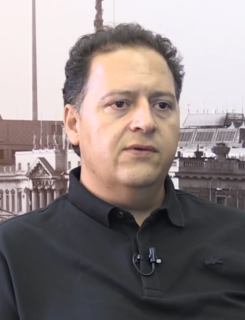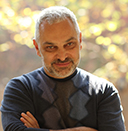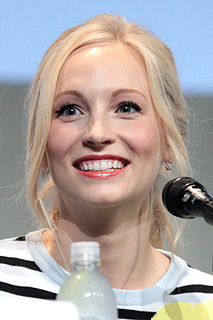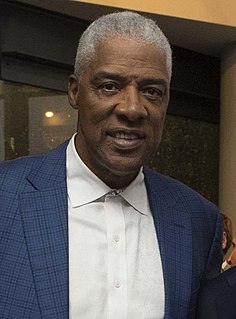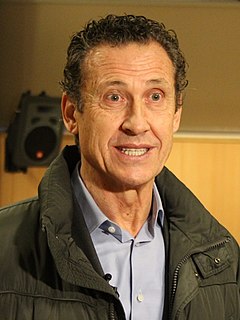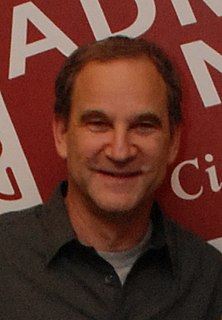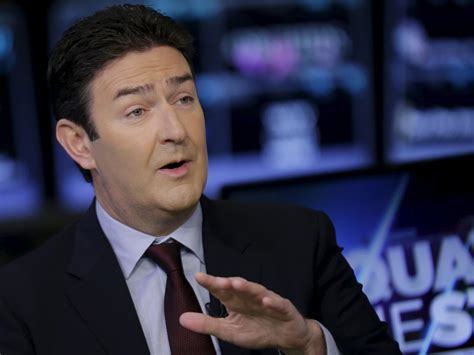Top 581 Analyze Quotes & Sayings - Page 9
Explore popular Analyze quotes.
Last updated on April 21, 2025.
...a major triumph of mathematical imagination: the use of visual imagery to condense a large quantity of information into a single comprehensible picture... Mathematicians are just beginning to understand these basic building blocks of change and to analyze how they combine. The methodology involved has a very different spirit from traditional modeling with differential equations: it is more like chemistry than calculus, requiring careful counterpoint between analysis and synthesis.
To my mind, there are two things that, in life, you can do about death. Either you can choose to ignore it, in which case you may have some success in making the idea of it go away for a limited period of time, or you can confront the prospect of your own death and try to analyze it and, in so doing, try to minimize some of the inevitable suffering that it causes. Neither way can you actually overcome it.
Of course, I think this is something that Netflix does much better. If you analyze the enormous amounts of effort and attention that has been given to my father's image due to Narcos, I am sure of one thing: if I did the same exact thing that Netflix does with my father's image, I would be killed, do not doubt it for a second.
Every time I think that political analysts and writers will finally recognize that most of them don't understand much about political polls, they prove me wrong. They don't know how to read them; they don't understand the importance of cross tabs within a given poll, and they don't know how to analyze them.
If you say, "I'm bursting with joy," a scientist could analyze your skin and find it loaded with neuropeptides that may have antidepressant effects and that may modulate the immune system. If you say, "I feel exhilarated, unbounded, and joyful," and I were to examine your blood, I would find high levels of interleukin and interferon, which are powerful anticancer drugs.
In case you haven't heard, my girlfriends and I have declared the summer of 2012 as the best summer ever. The best way to document said 'best summer ever' is with a good ol' disposable camera. Smile, click, move on! Nobody gets pic approval, and there's no time wasted gathering around the camera to analyze a moment that just happened.
Trying to analyze a situation without enough data was like looking at a photograph of a ball in flight and trying to gauge its direction. Is it going up, down, sideways? Is it about to collide with a baseball bat? Is it moving at all, or is something on the blind side holding it in place? A single frame didn't mean a thing. Patterns were based on data. With enough datapoints, you could predict just about anything.
First of all, women inherently, I think, are quite capable of having lots of balls in the air. And so, like, it's all those skills you use; you analyze the problem, figure out your tools, and then go at it piece by piece.... It's like what you have to do in the morning to get your kids out the door [if you're a parent]. The skills are, I believe, the same. The patience issues are the same.
Failure's relative. I've always felt, even early on, if I lose the freedom to fail, something's not right about that. It's how you treat failure, too. There's something to learn from it. I've had movies that have failed colossally, so you kind of analyze your failures: What kind of failure was it? A failure because it's misunderstood by others? A failure because you misunderstood it yourself?
Rules of Play is an exhaustive, clear, cogent, and complete resource for understanding games and game design. Salen and Zimmerman describe an encyclopedia of game design issues, techniques, and attributes. In particular, they analyze the elements that can make a game experience richer, more interesting, more emotional, more meaningful, and, ultimately, more successful. It should be the first stop you make when learning about game design.
You could analyze me and say that my father leaving and being absent was a motivator for early ambition, trying to prove myself to this apparition who had vanished. You could argue that me being a mixed kid in a place where there weren't a lot of black kids around might have spurred on my ambitions. You could go through a whole litany of things that sparked me wanting to do something important.
I think I mainly climb mountains because I get a great deal of enjoyment out of it. I never attempt to analyze these things too thoroughly, but I think that all mountaineers do get a great deal of satisfaction out of overcoming some challenge which they think is very difficult for them, or which perhaps may be a little dangerous.
Joyous Sound evolved from a gospel influence. Actually it evolved out of sitting at a piano and just picking out a riff, a gospel type riff. It just seemed to come joyously-something about the song, about living in another place of joyous sounds. I'm not quite sure-that's one I'm trying to analyze. It just came out.
Failure is all a matter of perspective. Think of all the people you admire. I guarantee you they all failed at one time or another. The key is to recognize setbacks for what they really are-entry points for learning, not validation that you aren't good enough. After a disappointment analyze your actions, get feedback from friends, and take inventory of what you could do better next time. This type of self-reflection and improvement will ultimately make success inevitable.
Millions of people never analyze themselves. Mentally they are mechanical products of the factory of their environment, preoccupied with breakfast, lunch, and dinner, working and sleeping, and going here and there to be entertained. They don't know what or why they are seeking, nor why they never realize complete happiness and lasting satisfaction. By evading self-analysis, people go on being robots, conditioned by their environment. True self-analysis is the greatest art of progress.
As an academic I feel I should intellectualize and theoretically analyze when all I really want to do is let the work take me somewhere, manipulate me, and then rough me up a bit. When it comes right down to it, I only want to spend time with work that makes me think and teaches me something while making my body react.
One day, when I was doing well in class and had finished my lessons, I was sitting there trying to analyze the game of tic-tac-toe... The teacher came along and snatched my papers on which I had been doodling... She did not realize that analyzing tic-tac-toe can lead into dozens of non-trivial mathematical questions.
Young people today are flooded with disconnected images but lack a sympathetic instrument to analyze them as well as a historical frame of reference in which to situate them. I am reminded of an unnerving scene in Stanley Kubrick's epic film, 2001: A Space Odyssey, where an astronaut, his air hose cut by the master computer gone amok, spins helplessly off into space.
You don't know the things in your childhood that influence you. You can't possibly know them. People today try to analyze the early environment and the reasons for something that happened, but if you look at children of the same family -- children who have identical parents, go to identical schools, have an almost identical upbringing, and yet who have totally different experiences and neuroses -- you realize that what influences the children is not so much the obvious externals as their emotional experiences. Of course any psychiatrist knows that.
But learned people can analyze for me why I fear hell and their implication is that there is no hell. But I believe in hell. Hell seems a great deal more feasible to my weak mind than heaven. No doubt because hell is a more earth-seeming thing. I can fancy the tortures of the damned but I cannot imagine the disembodied souls hanging in a crystal for all eternity praising God.
I don't have any problem with the United States acting on behalf of its own interests. That's what big powers do; that's what all countries do. I would just like to see us analyze in a serious way what really is in our interest. Sometimes we intervene in foreign countries in ways that seem successful at first. In the end, however, we wind up with unpredicted consequences that make us regret those operations.
A person with faith does not question its roots, for he knows that if he subjected it to the critical examination of his intellect, he would end up without faith. The same thing can be said of any feeling. You can analyze any feeling to death, but when you do that, you end up without feeling and without a meaninful life.
It's interesting: I went 25 years without watching a single television show. I was one of those people, because I was so inside how a television show was made, if I would turn on somebody else's show, I would sit there and analyze it, like, 'Oh, so they had four hours in this location and had to get out and the number of set-ups, etc.'
By the time it becomes obvious that a technology will have truly disruptive impact, it is often too late to take action. This is one reason why we are such advocates of using theory to try to analyze industry change. Conclusive evidence that proves that a company needs to take action almost never exists. In fact, the data can fool management, lulling them into a false sense of security.
A detective novel should contain no long descriptive passages, no literary dallying with side-issues, no subtly worked-out character analyses, no 'atmospheric' preoccupations. Such matters have no vital place in a record of crime and deduction. They hold up the action and introduce issues irrelevant to the main purpose, which is to state a problem, analyze it, and bring it to a successful conclusion. To be sure, there must be a sufficient descriptiveness and character delineation to give the novel verisimilitude.
Remember that every government service, every offer of government - financed security, is paid for in the loss of personal freedom... In the days to come, whenever a voice is raised telling you to let the government do it, analyze very carefully to see whether the suggested service is worth the personal freedom which you must forgo in return for such service.
Carrying a small notebook with you always, in your pocket or purse, along with a reliable ballpoint pen will enable you to jot down spot observations and quick character sketches before the first sharp impressions fade away. You'll need all kinds of story actors, because even picture books can include a wide range of ages, relationships, occupations, and nationalities. Learn to observe and analyze swiftly, wherever you are.
There seems to be an assumption that if you're offended by movie brutality, you are somehow playing into the hands of the people who want censorship. But this would deny those of us who don't believe in censorship the use of the only counter-balance: the freedom of the press to say that there's anything conceivably damaging in these films - the freedom to analyze their implications. How can people go on talking about the dazzling brilliance of movies and not notice that the directors are sucking up to the thugs in the audience?
The phase of the usury system which we are trying to analyze is more or less Patterson's perception that the Bank of England could have benefit of all the interest on all the money that it creates out of nothing. ... Now the American citizen can, of course, appeal to his constitution, which states that Congress shall have power to coin money or regulate the value thereof and of foreign coin. Such appeal is perhaps quixotic.
"Humanism" is to be human, to think, to analyze, and to probe. To respond and to be stimulated by all living things - beasts, fowl, and fishes. To respond through touch, sight, smell, and sound to all things in nature - both organic and inorganic-to colors, shapes, and textures - to not only look at a blade of grass but to really see a blade of grass. These things, to me, are what life and living are all about. I would call it "Humanism."
I just wanted to honor who Emily was. She's just a strong woman. Through my journey of playing her, I found a lot of strength, and I think that I've changed, as a female, in the way that I carry myself. To go through something traumatic, like getting your face scarred, it made me analyze vanity a lot. When you have a little pimple and you're like, "Oh, my god, there's an alien on my face!," you feel like it's magnified.
The receipt to make a speaker, and an applauded one too, is short and easy. Take common sense quantum sufficit; add a little application to the rules and orders of the House [of Commons], throw obvious thoughts in a new light, and make up the whole with a large quantity of purity, correctness and elegancy of style. Take it for granted that by far the greatest part of mankind neither analyze nor search to the bottom; they are incapable of penetrating deeper than the surface.
I think every time you coach a certain team, when you leave that franchise, I think you continue to grow. You take a look at the things that you did, the things you wish you had done better. You analyze your strengths and your weaknesses, and then when you move to your next job, you continue to do the same thing.
And then there are my friends, and they have their own lives. While they like to talk everything through, to analyze and hypothesize, what I really need, what I'm really looking for, is not something I can articulate. It's nonverbal: I need love. I need the thing that happens when your brain shuts off and your heart turns on. And I know it's around me somewhere, but I just can't feel it.
I began to analyze the movie [The Day the Earth Stood Still] and said it was really made out of these two characters [Nikola Tesla and Leon Teremin] who were brought together. That made it fascinating to me. And especially the language they made up, that Klaatu speaks. Because it has a Latin word order. It's like medieval Latin, but it had some Navajo phonemes in it and that kind of stuff.
When it comes to horror there's a strange need to analyze. When "evil children" fad happened, there was The Exorcist and The Other and The Omen. People would say, "What this really means is that Americans don't want to have kids anymore. They feel hostility towards their own children. They feel they're being tied down and dragged down." In fact, in most cases, what those books are about is nice children who are beset by forces beyond their control.
I'm not even sure I like surgery, but I like what it does, I like the effects. I like to be able to give people longevity and quality of life, and I also think it's good for people to use the special gifts and talents that they have. And when I was in medical school, when I began to analyze the gifts and talents that I had, I realized that surgery would probably be a very good fit for me.
One can study what exists and how consciousness functions; but one cannot analyze (or “prove”) existence as such, or consciousness as such. These are irreducible primaries. (An attempt to “prove” them is self-contradict ory: it is an attempt to “prove” existence by means of nonexistence, and consciousness by means of unconsciousness .)
Focus attention on the feeling inside you. Know that it is the pain-body. Accept that it is there. Don't think about it - don't let the feeling turn into thinking. Don't judge or analyze. Don't make an identity for yourself out of it. Stay present, and continue to be the observer of what is happening inside you. Become aware not only of the emotional pain but also of "the one who observes," the silent watcher. This is the power of the Now, the power of your own conscious presence. Then see what happens.
The feeling I have reminds me of New Year’s Eve, when the countdown is coming and I’m not quite sure whether to grab my camera or just live in the moment. Usually I grab the camera and later regret it when the picture doesn’t turn out. Then I feel enormously let down and think to myself that the night would have been more fun if it didn’t mean quite so much, if I weren’t forced to analyze where I’ve been and where I’m going.
Make it a habit to ask yourself: What's going on inside me at this moment? That question will point you in the right direction. But don't analyze, just watch. Focus your attention within. Feel the energy of the emotion. If there is no emotion present, take your attention more deeply into the inner energy field of your body. It is the doorway into Being.
To think, analyze and invent, he [Pierre Menard] also wrote me, “are not anomalous acts, but the normal respiration of the intelligence. To glorify the occasional fulfillment of this function, to treasure ancient thoughts of others, to remember with incredulous amazement that the doctor universal is thought, is to confess our languor or barbarism. Every man should be capable of all ideas, and I believe that in the future he will be." (Jorge Luis Borges, "Pierre Menard, Author of Don Quixote, 1939)
The silence of the spheres is the music of a wedding feast. The more we persist in misunderstanding the phenomena of life, the more we analyze them out into strange finalities and complex purposes of our own, the more we involve ourselves in sadness. But it does not matter much because no despair of ours can alter the reality of things, or stain the joy of the cosmic dance which is always there.
I write a lot, poems and such, and when I look at it the next day, I can analyze what the problem is and find the solution. It's the same when I watch myself on the big screen, but first, my vanity has to go away and so I have to watch it ten times. But when it has gone, and I don't think my nose is too big and everything else, then I start analyzing, and I think it helps me to become a better person.
A human being should be able to change a diaper, plan an invasion, butcher a hog, conn a ship, design a building, write a sonnet, balance accounts, build a wall, set a bone, comfort the dying, take orders, give orders, cooperate, act alone, solve equations, analyze a new problem, pitch manure, program a computer, cook a tasty meal, fight efficiently, die gallantly. Specialization is for insects.
I really don't put it down. I never have. It's just that I analyze it and look at it from a very rational point of view. I don't see it as coming from God and say that at a certain point the Holy Spirit zaps you with a super whammy on the head and you've "gone for tongues" and there is it. Tongues is a process that people build up to. Then, as you start to do something, just as when you practice the scales on the piano, you get better at it.
"Cynicism," like "heresy" and "heterodoxy" and "atheism" and "agnosticism" and "paganism" and "heathenism," is above all else a way for organized orthodoxy's caste of official censors to encyst and segregate and thus neutralize all contrarian forms of seeing and thinking, all (necessarily implicitly) prohibited and repressed ways of exercising disruptive and iconoclastic intuition and intellection (for to analyze and explain these things too openly is to give them publicity and potential cogency when the point is to asphyxiate them).


